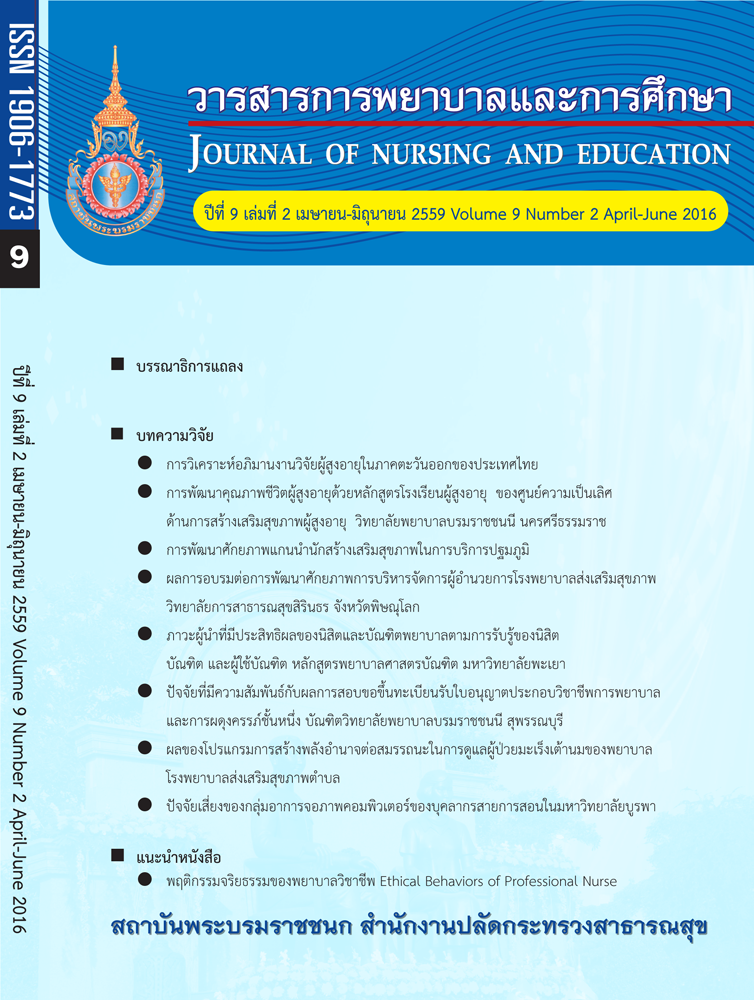การพัฒนาศักยภาพแกนนำการสร้างเสริมสุขภาพในระบบบริการระดับปฐมภูมิและการทำงานเชิงรุกแบบมีส่วนร่วม
คำสำคัญ:
competency, primary care, proactive participationบทคัดย่อ
บทคัดย่อ
ปัญหาสุขภาพของประชาชนมักเกิดจากปัจจัยหลายสาเหตุที่เกี่ยวข้องโดยตรงกับมิติทางสังคม การสร้างเสริมสุขภาพควรเน้นการมีส่วนร่วมของทุกภาคส่วน เช่น นโยบาย การเกษตร การศึกษา การสาธารณสุขและชุมชน ความร่วมมือของภาคส่วนต่างๆจะช่วยให้เกิดความยั่งยืนทางด้านสุขภาพ การศึกษาเชิงปฏิบัติการแบบมีส่วนร่วมมีวัตถุประสงค์ เพื่อพัฒนาศักยภาพของทีมแกนนำสุขภาพชุมชนที่ประกอบด้วย เจ้าหน้าที่โรงพยาบาลส่งเสริมสุขภาพตำบล องค์กรปกครองส่วนท้องถิ่น ชาวบ้าน องค์กรในชุมชนในการสร้างเสริมสุขภาพในระบบบริการระดับปฐมภูมิและการทำงานเชิงรุกแบบมีส่วนร่วม กลุ่มผู้ให้ข้อมูลจำนวน 40 คน จาก 6 พื้นที่ เก็บรวบรวมข้อมูลโดยประชุมกลุ่ม การสัมภาษณ์ และการสังเกตแบบไม่มีส่วนร่วม วิเคราะห์ข้อมูลโดยใช้การวิเคราะห์เนื้อหา
ผลการวิจัยพบว่า การพัฒนาทีมแกนนำสุขภาพชุมชนประกอบด้วย 1) ชุมชนจัดหาทีมงาน 2) พัฒนาศักยภาพทีมแกนนำโดยการให้ความรู้เกี่ยวกับการสร้างเสริมสุขภาพ การจัดการทางสังคมและพัฒนาทักษะการมีส่วนร่วมที่จะช่วยให้สามารถวิเคราะห์รากเหง้าของปัญหา ปัจจัยเสี่ยงต่อภาวะสุขภาพและการดำเนินการเพื่อลดปัญหาโดยอาศัยศักยภาพของชุมชน โดยใช้เครื่องมือ 4 ชนิดคือ ต้นไม้ปัญหา ตุ๊กตาชุมชน แผนที่ชุมชนและเส้นทางการผลิตและ 3) พัฒนาแผนงานโครงการที่ลงสู่ชุมชน ศักยภาพของทีมแกนนำที่เกิดในระยะที่ 1 มีดังนี้ การให้เกียรติและคุณค่าต่อผู้อื่น การสื่อสารและการสร้างสัมพันธภาพ มีโครงการเกิดขึ้น 5 โครงการที่ได้รับการสนับสนุนทุนจากองค์การบริหารส่วนตำบล เน้นด้านอาหารปลอดภัย อาหารอินทรีย์ การขจัดกลิ่นเหม็นจากสุกร และการจัดการขยะ
จากการศึกษาการจัดการด้านสุขภาพในระดับปฐมภูมิต้องการการมีส่วนร่วมจากทุกภาคส่วนการพัฒนาศักยภาพด้านสุขภาพในมิติด้านสังคมจะช่วยให้เกิดการขับเคลื่อนสุขภาพในชุมชน ช่วยแก้ปัญหาและค้นหาแนวทางการแก้ปัญหา
คำสำคัญ: ศักยภาพ ระบบบริการระดับปฐมภูมิ การทำงานเชิงรุกแบบมีส่วนร่วม
The Development Competencies of Multisectoral Partnership at Primary Care and Proactive Participation with Social Health Determinant
Abstract
The elements of health promotion relate to social determinants of health. Health promotion should integrate with many sectors: politics, agriculture, education, public health and communities. These sectors have collaborative work and partnership to achieve sustainable health. This participatory action research was conducted to increase the competencies of Community Health Team Leaders namely: primary health care hospital, sub-district administrative organization, people in the community, health organizations in the community, and village health volunteers. There were 40 participants from 6 settings in this study. Data were collected from group discussion, in-depth interview and observation. Data were analyzed and validated by using content analysis.
The research finding: The development of Community Health Team Leaders competencies had many processes: 1) selected the team leader by communities, 2) built capacities of team leaders by providing the knowledge of health promotion, management of social health and developing participation skills which help to critical analyze the root of problems, risk factors of health and implement actions to reduce health inequities based on potential of the community. The 4 tools used in this process: community tree, dolly community, community map and path of production and 3) developed project and programme management that collaborated with communities. The capacities of Community Health Team Leaders developed after completion of the 1st phrase are as follows: team management with respect , communication and interpersonal relationships, self-analysis and open-mindedness, empowerment, collaboration and change agents. The 5 projects with supporting budgets from sub-district administrative organizations undertaken in this study focused on food safety, organic food, eliminating dung odor in the community, and waste management in community.
Social heath management in primary care requires collaboration and partnership from all sectors. The development of all sectors competencies on social heath determinants will be the key to drive for healthy communities, to solve the problem and to create the solutions.
Keywords: competency, primary care, proactive participation





